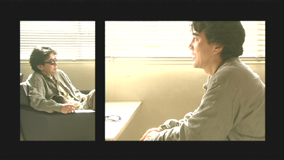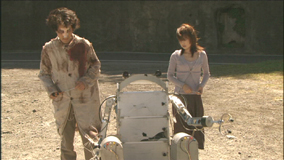|
Newest Reviews:
New Movies -
The Tunnel
V/H/S
The Tall Man
Mama Africa
Detention
Brake
Ted
Tomboy
Brownian Movement
Last Ride
[Rec]³: Genesis
Hara-Kiri: Death of a Samurai
Indie Game: The Movie
Abraham Lincoln: Vampire Hunter
Old Movies -
Touki Bouki: The Journey of the Hyena
Drums Along the Mohawk
The Chase
The Heiress
Show
People
The Strange Affair of Uncle Harry
Pitfall
Driftwood
Miracle Mile
The Great Flamarion
Dark Habits
Archives -
Recap: 2000,
2001, 2002,
2003, 2004
, 2005, 2006,
2007 , 2008
, 2009 ,
2010 , 2011 ,
2012
All reviews alphabetically
All reviews by star rating
All reviews by release year
Masterpieces
Screening Log
Links
FAQ
E-mail me
HOME
| |
Doppelganger (Kiyoshi Kurosawa, 2003)
 Japanese director Kiyoshi Kurosawa
achieves a real breakthrough with Doppelganger,
his latest horror film. Though it's not as ambitious or deep as many of his
films are, it's more successful than any that I've seen to date. Perhaps more
significantly, at least for me, it's the first one of Kurosawa's films that I
would describe as fun. Doppelganger
begins with a set-up similar to Kurosawa's other movies. There's the slow
encroachment of a mysterious supernatural force, the main character's worldly
frustrations acting as a conduit for that unexplained evil, and parallels for
that specter in our technology (specifically here, a mind-controlled robotic
wheelchair that acts upon one's will). Once the mischievous doppelganger shows
up, however, the movie takes on an unexpected, and totally welcome, comic spin.
Koji Yakusho, who has appeared in several other Kurosawa films, is used superbly
in the lead, double role of Michio. Michio, an inventor whose unsupportive
corporate environment has him in a slump, has his life take a drastic turn when
an honest-to-goodness doppelganger appears before him and begins to forcibly
remove the obstacles in the way of Michio creative process. Japanese director Kiyoshi Kurosawa
achieves a real breakthrough with Doppelganger,
his latest horror film. Though it's not as ambitious or deep as many of his
films are, it's more successful than any that I've seen to date. Perhaps more
significantly, at least for me, it's the first one of Kurosawa's films that I
would describe as fun. Doppelganger
begins with a set-up similar to Kurosawa's other movies. There's the slow
encroachment of a mysterious supernatural force, the main character's worldly
frustrations acting as a conduit for that unexplained evil, and parallels for
that specter in our technology (specifically here, a mind-controlled robotic
wheelchair that acts upon one's will). Once the mischievous doppelganger shows
up, however, the movie takes on an unexpected, and totally welcome, comic spin.
Koji Yakusho, who has appeared in several other Kurosawa films, is used superbly
in the lead, double role of Michio. Michio, an inventor whose unsupportive
corporate environment has him in a slump, has his life take a drastic turn when
an honest-to-goodness doppelganger appears before him and begins to forcibly
remove the obstacles in the way of Michio creative process.
 Doppelganger provides no concrete reason for the emergence of Michio’s
double, but as in Kurosawa’s other films, there seems to be a general social
malaise contributing to its presence. A subplot about another character’s
doppelganger progresses to the point where the twin begins writing the novel
that the original being never got around to writing, suggesting that, in the
film’s universe, unrealized dreams eat away at a person until a physical split
occurs. On a serious level, this is a movie about how when confronted with an
idealized version of ourselves, we begin to recognize our own limitations and
shrink away. More humorously, it’s about how an incarnation of ourselves with
the will to accomplish our dreams might not be as nice as we are. Michio’s
double is not so much malevolent as he is self-centered at all costs. That
characteristic allows Kurosawa to adopt a tone that starts out silly and
proceeds steadily toward absurdity throughout the last act. I wish the director
would combine this more approachable tone with his usual ambition, though. To
these eyes, Kurosawa still seems like a developing director, but he’s
admittedly an increasingly interesting one. For all of its deftly employed split
screens and double effects (which might not be impressive, per se, but are
seemless), the movie that Doppelganger most readily recalls is George
Romero’s Monkey Shines,
which similarly featured a monster that carried out the latent desires its
master could not express. Doppelganger is a simple movie, but it
is an entertaining ones. Fans of Kurosawa’s previous work might be
disappointed since it probes less into the depths of our bruised modern soul
than Kurosawa's other movies, but since I found those films to be a mixed bag of
pretension and profundity, I'm scarcely disappointed.
Doppelganger provides no concrete reason for the emergence of Michio’s
double, but as in Kurosawa’s other films, there seems to be a general social
malaise contributing to its presence. A subplot about another character’s
doppelganger progresses to the point where the twin begins writing the novel
that the original being never got around to writing, suggesting that, in the
film’s universe, unrealized dreams eat away at a person until a physical split
occurs. On a serious level, this is a movie about how when confronted with an
idealized version of ourselves, we begin to recognize our own limitations and
shrink away. More humorously, it’s about how an incarnation of ourselves with
the will to accomplish our dreams might not be as nice as we are. Michio’s
double is not so much malevolent as he is self-centered at all costs. That
characteristic allows Kurosawa to adopt a tone that starts out silly and
proceeds steadily toward absurdity throughout the last act. I wish the director
would combine this more approachable tone with his usual ambition, though. To
these eyes, Kurosawa still seems like a developing director, but he’s
admittedly an increasingly interesting one. For all of its deftly employed split
screens and double effects (which might not be impressive, per se, but are
seemless), the movie that Doppelganger most readily recalls is George
Romero’s Monkey Shines,
which similarly featured a monster that carried out the latent desires its
master could not express. Doppelganger is a simple movie, but it
is an entertaining ones. Fans of Kurosawa’s previous work might be
disappointed since it probes less into the depths of our bruised modern soul
than Kurosawa's other movies, but since I found those films to be a mixed bag of
pretension and profundity, I'm scarcely disappointed.
53
05-19-04
Jeremy Heilman
|